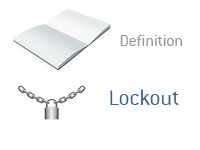Definition of Lockout
What is a "lockout"? What is the definition of the term "lockout"?
A "lockout" can sometimes take place during a labor dispute, and will involve an employer "locking out" its employees. By "locking" its employees out, an employer will not allow them to work, and the business will obviously grind to a halt. In this day and age, "locking out" employees usually involves rendering electronic keys inoperable and shutting down access to office computers. In days past, companies would go so far as to actually padlock the doors of their businesses.
 Why would an employer lock out its employees? Answer - to gain the upper hand in labor negotiations. Many collective bargaining agreements have a clause that allows both sides to continue an existing deal without having a new deal in place. However, an employer may decide that the current CBA is unacceptable and simply lock their employees out. Employees have bills to pay and families to feed, and companies will use this to their advantage when it comes to negotiating a new collective bargaining agreement. Unions will therefore set aside a certain amount of union dues to give their members some money when there is a lockout or strike.
Why would an employer lock out its employees? Answer - to gain the upper hand in labor negotiations. Many collective bargaining agreements have a clause that allows both sides to continue an existing deal without having a new deal in place. However, an employer may decide that the current CBA is unacceptable and simply lock their employees out. Employees have bills to pay and families to feed, and companies will use this to their advantage when it comes to negotiating a new collective bargaining agreement. Unions will therefore set aside a certain amount of union dues to give their members some money when there is a lockout or strike. The opposite of a "lockout" is a "strike", which occurs when employees refuse to work. Similar to a "lockout", a "strike" will cause great harm to a business, especially if it lasts for a lengthy period of time.
--
Davemanuel.com Articles That Mention Lockout:
Average NHL Franchise Value Up $300 Million+ Over Past Decade
NFLRA, NHLPA Lockouts Prove That Fans Come Last
Simultaneous Work Stoppages Likely for Two Major North American Sports Leagues
Economic Turmoil Could Result in Work Stoppages in Two Major North American Sports Leagues Next Year
